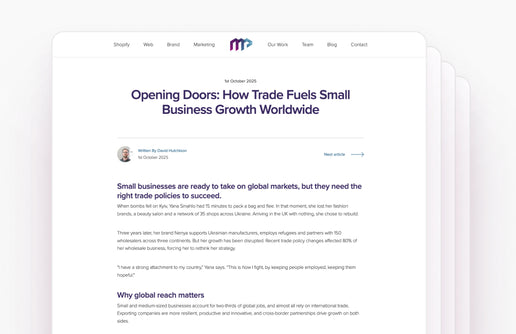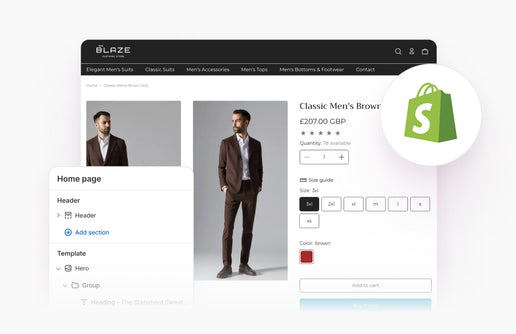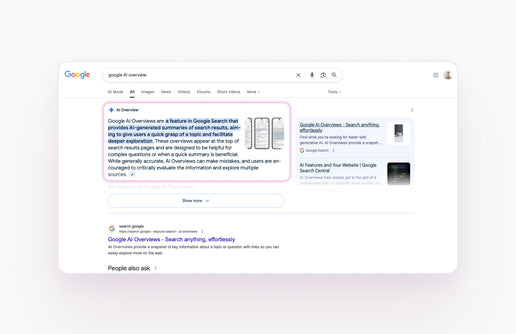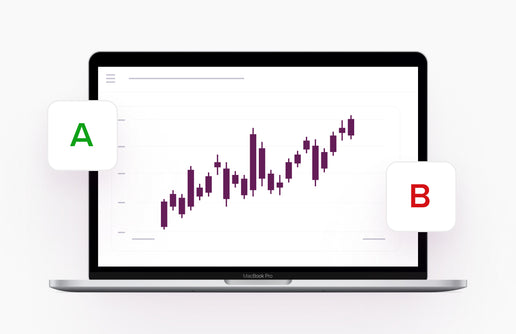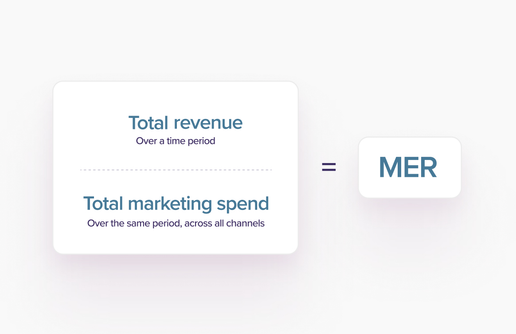Small businesses are ready to take on global markets, but they need the right trade policies to succeed.
When bombs fell on Kyiv, Yana Smahlo had 15 minutes to pack a bag and flee. In that moment, she lost her fashion brands, a beauty salon and a network of 35 shops across Ukraine. Arriving in the UK with nothing, she chose to rebuild.
Three years later, her brand Nenya supports Ukrainian manufacturers, employs refugees and partners with 150 wholesalers across three continents. But her growth has been disrupted. Recent trade policy changes affected 80% of her wholesale business, forcing her to rethink her strategy.
"I have a strong attachment to my country," Yana says. "This is how I fight, by keeping people employed, keeping them hopeful."
Why global reach matters
Small and medium-sized businesses account for two-thirds of global jobs, and almost all rely on international trade. Exporting companies are more resilient, productive and innovative, and cross-border partnerships drive growth on both sides.
This is why Shopify advocates for open trade. When small businesses can sell across borders, innovation accelerates, communities benefit and entrepreneurship flourishes. Global reach should not be reserved for large corporations.
But many entrepreneurs face new pressures. Taxes on imports now rank among the top operational concerns in the US, UK, Canada, Germany and Australia.
"It's the uncertainty that is the greatest hamstring because you don't want to make any hard and fast decisions given these shifting sands," says Ariana Hendry, co-founder of Beysis, an Australian personalised products company. “We're just trying to diversify our risk so that we don't put all our eggs in one basket."
Adapting to shifting markets
Entrepreneurs are constantly adjusting to changing conditions. Yana is exploring new markets in Europe and the Middle East to counter slower wholesale sales. "With my retail partners everything has slowed down as we figure out the situation," she says. "My margins are not big, so I'm trying to change strategies."
Ariana’s team has also adapted. "At the start of this year it became obvious there were going to be some significant changes," she explains. "We started to re-engage with everyone from FedEx to DHL to Australia Post, and basically cherry-picked which carrier is the best for each market as opposed to just blanket using one provider.”
The review took months but left Beysis stronger. They shifted focus to growing markets like New Zealand, Singapore and the EU, while launching 12 new products at home.
"As a business owner, you have to have the mentality that these challenges are opportunities and not be deflated by them," Ariana says. "It's like human nature. Survive, adapt, and thrive."
The role of technology
Large corporations have teams for every issue. Small business owners often solve problems on their own.
"When you are a small business, the thing that restricts growth the most is just finite resources," Ariana says.
Tools such as Shopify Markets and Shopify Translate & Adapt help by streamlining operations. Beysis uses them to monitor performance and update prices instantly when conditions change. But even the best technology needs supportive trade policies to work effectively.
Policy makes the difference
Some countries are taking steps in the right direction. The EU’s €150 de minimis threshold and the UK’s £135 equivalent reduce paperwork. Singapore offers rapid financing for pivots, and Japan has digitised its customs system. Yet progress can be undone quickly, as with the EU’s proposed handling fee on small shipments.
"Small to medium businesses' whole premise is just problem-solving and putting out fires," Ariana says. "This is just the fire of 2025 that we're needing to keep under control. It’s a challenge, but this isn't going to be the thing that breaks us.”
Entrepreneurs are resilient, but they cannot do it alone. For them, trade policy is not abstract. It determines whether their businesses survive or grow.
If small businesses are to thrive worldwide, trade must be simple, predictable and open. That is how we build a future where anyone, anywhere, can grow.
THE LATEST MARKETING INSIGHTS


